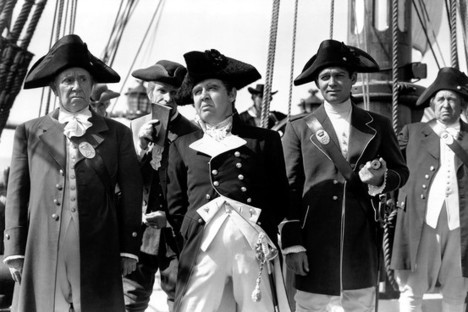 “In the foreground, Ian Wolfe, Charles Laughton and Clark Gable in 1935’s ‘Mutiny on the Bounty.'” Source of caption and photo: online version of the WSJ article quoted and cited below.
“In the foreground, Ian Wolfe, Charles Laughton and Clark Gable in 1935’s ‘Mutiny on the Bounty.'” Source of caption and photo: online version of the WSJ article quoted and cited below.
(p. D10) In 1947 Charles Laughton’s career, if not quite on the skids, was definitely in the doldrums. Long acclaimed as Hollywood’s foremost character actor, he had made only one film of any artistic consequence, Jean Renoir’s “This Land Is Mine,” in the past seven years. The rest of the time he coasted, frequently indulging in self-parody–and nobody was easier to spoof than the man who played Captain Bligh in “Mutiny on the Bounty” and Quasimodo in “The Hunchback of Notre Dame.” He wouldn’t have been the first actor to sell his soul for a swimming pool (or, in his case, an art collection). But with Mr. Laughton the waste would have been unforgivable, since he was, in Laurence Olivier’s words, “the only actor I ever knew who was a genius.”
Instead, Mr. Laughton fooled everyone by returning to the stage for the first time since 1936. Nor did he choose a safe star vehicle for his return: He played the title role in the U.S. premiere of Bertolt Brecht’s “Galileo,” and he translated the play himself.
. . .
Except for “The Night of the Hunter,” Mr. Laughton’s post-“Galileo” career is no longer widely remembered save by scholars. But enough of it survives on sound recordings and kinescopes to prove that F. Scott Fitzgerald was all wet when he claimed that “there are no second acts in American lives.” Charles Laughton, who moved from England to America to seek fame and fortune and came perilously close to losing his soul along the way, had a second act that redeemed all that came before it. No actor could ask for a better curtain.
For the full commentary, see:
TERRY TEACHOUT. “SIGHTINGS; Charles Laughton’s Late Bounty.” The Wall Street Journal (Fri., March 2, 2012): D10.
(Note: ellipsis added.)
(Note: the online version of the commentary has the date March 1, 2012.)
